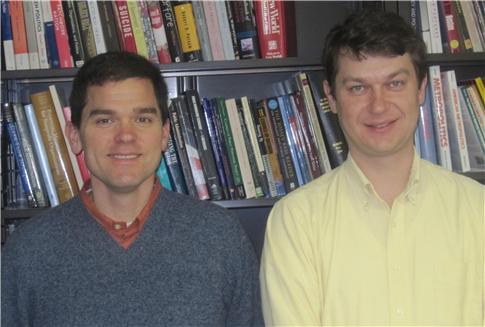Political Science Hires Two New Faculty Members

Dr. Brady Baybeck (on the left), joins the Department this year as a tenured Associate Professor of Political Science and Director of the Graduate Program in Public Administration. Dr. Baybeck earned his B.A. from the University of Michigan and his Ph.D. from Washington University in St. Louis. He comes to the Department from the University of Missouri - St. Louis where he was the Director of their Graduate Program in Public Policy Administration.
Dr. Baybeck's primary interests are in the areas of American politics and political geography. His publications, including articles in The Journal of Politics ("A Strategic Theory of Policy Diffusion via Intergovernmental Competition"), Social Science Quarterly ("Location of Public Goods and the Calculus of Voting: The Seattle Monorail Referendum"), and The Journal of Politics ("Sorting Out the Competing Effects of Racial Context"), are indicative of his interests and the range of his knowledge in the discipline. While serving as the Director of the MPA Program, Dr. Baybeck will continue with both research and publishing and will also maintain an active presence in national and regional conferences.
Dr. Jeffrey Grynaviski (on the right) joined the Department as a tenured Associate Professor of Political Science this academic year. He received his undergraduate degree from the College of William and Mary and his Ph.D. from Duke University. He came to Wayne State University from the University of Connecticut where he spent a year as Assistant Professor-in-Residence. Prior to his year at the University of Connecticut, he was an Assistant Professor at the University of Chicago for eight years.
Dr. Grynaviski's research in the areas of American political parties, electoral politics, and research methods will help strengthen the Department in those areas. Among his current projects is an analysis of the consequences of rule by an electorally dominant political machine for the provision of pure "public goods." Contrary to conventional wisdom, he argues that political machines provided greater amounts of productive public goods than other ruling parties because their survival depended on an expansive government sector sustained by tax revenues raised locally. He finds that cities controlled by political machines during the early 20th century were better at providing hard-to-target public goods like fire safety and preventing the spread of contagious diseases than were other municipalities, even after controlling for political institutions and demographic factors.